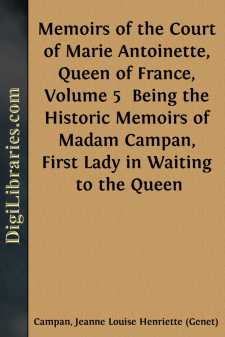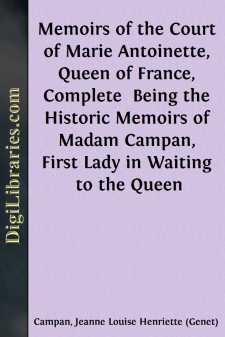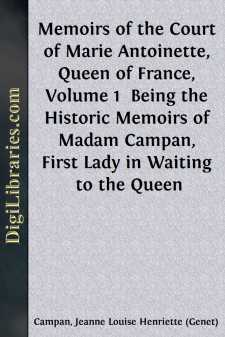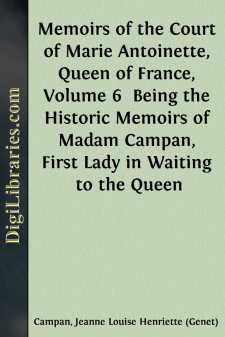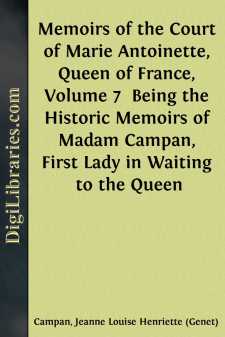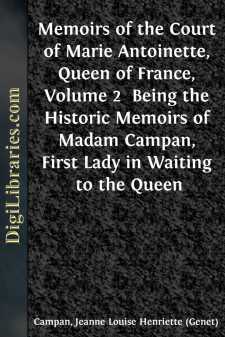Categories
- Antiques & Collectibles 13
- Architecture 36
- Art 48
- Bibles 22
- Biography & Autobiography 813
- Body, Mind & Spirit 142
- Business & Economics 28
- Children's Books 17
- Children's Fiction 14
- Computers 4
- Cooking 94
- Crafts & Hobbies 4
- Drama 346
- Education 46
- Family & Relationships 57
- Fiction 11829
- Games 19
- Gardening 17
- Health & Fitness 34
- History 1377
- House & Home 1
- Humor 147
- Juvenile Fiction 1873
- Juvenile Nonfiction 202
- Language Arts & Disciplines 88
- Law 16
- Literary Collections 686
- Literary Criticism 179
- Mathematics 13
- Medical 41
- Music 40
- Nature 179
- Non-Classifiable 1768
- Performing Arts 7
- Periodicals 1453
- Philosophy 64
- Photography 2
- Poetry 896
- Political Science 203
- Psychology 42
- Reference 154
- Religion 513
- Science 126
- Self-Help 84
- Social Science 81
- Sports & Recreation 34
- Study Aids 3
- Technology & Engineering 59
- Transportation 23
- Travel 463
- True Crime 29
Memoirs of the Court of Marie Antoinette, Queen of France, Volume 5 Being the Historic Memoirs of Madam Campan, First Lady in Waiting to the Queen
Categories:
Description:
Excerpt
CHAPTER I.
The ever-memorable oath of the States General, taken at the Tennis Court of Versailles, was followed by the royal sitting of the 23d of June. In this seance the King declared that the Orders must vote separately, and threatened, if further obstacles were met with, to himself act for the good of the people. The Queen looked on M. Necker's not accompanying the King as treachery or criminal cowardice: she said that he had converted a remedy into poison; that being in full popularity, his audacity, in openly disavowing the step taken by his sovereign, had emboldened the factious, and led away the whole Assembly; and that he was the more culpable inasmuch as he had the evening before given her his word to accompany the King. In vain did M. Necker endeavour to excuse himself by saying that his advice had not been followed.
Soon afterwards the insurrections of the 11th, 12th, and 14th of July—[The Bastille was taken on the 14th July, 1789.]—opened the disastrous drama with which France was threatened. The massacre of M. de Flesselles and M. de Launay drew bitter tears from the Queen, and the idea that the King had lost such devoted subjects wounded her to the heart.
The character of the movement was no longer merely that of a popular insurrection; cries of "Vive la Nation! Vive le Roi! Vive la Liberte!" threw the strongest light upon the views of the reformers. Still the people spoke of the King with affection, and appeared to think him favourable to the national desire for the reform of what were called abuses; but they imagined that he was restrained by the opinions and influence of the Comte d'Artois and the Queen; and those two august personages were therefore objects of hatred to the malcontents. The dangers incurred by the Comte d'Artois determined the King's first step with the States General. He attended their meeting on the morning of the 15th of July with his brothers, without pomp or escort; he spoke standing and uncovered, and pronounced these memorable words: "I trust myself to you; I only wish to be at one with my nation, and, counting on the affection and fidelity of my subjects, I have given orders to the troops to remove from Paris and Versailles." The King returned on foot from the chamber of the States General to his palace; the deputies crowded after him, and formed his escort, and that of the Princes who accompanied him. The rage of the populace was pointed against the Comte d'Artois, whose unfavourable opinion of the double representation was an odious crime in their eyes. They repeatedly cried out, "The King for ever, in spite of you and your opinions, Monseigneur!" One woman had the impudence to come up to the King and ask him whether what he had been doing was done sincerely, and whether he would not be forced to retract it.
The courtyards of the Chateau were thronged with an immense concourse of people; they demanded that the King and Queen, with their children, should make their appearance in the balcony. The Queen gave me the key of the inner doors, which led to the Dauphin's apartments, and desired me to go to the Duchesse de Polignac to tell her that she wanted her son, and had directed me to bring him myself into her room, where she waited to show him to the people....


